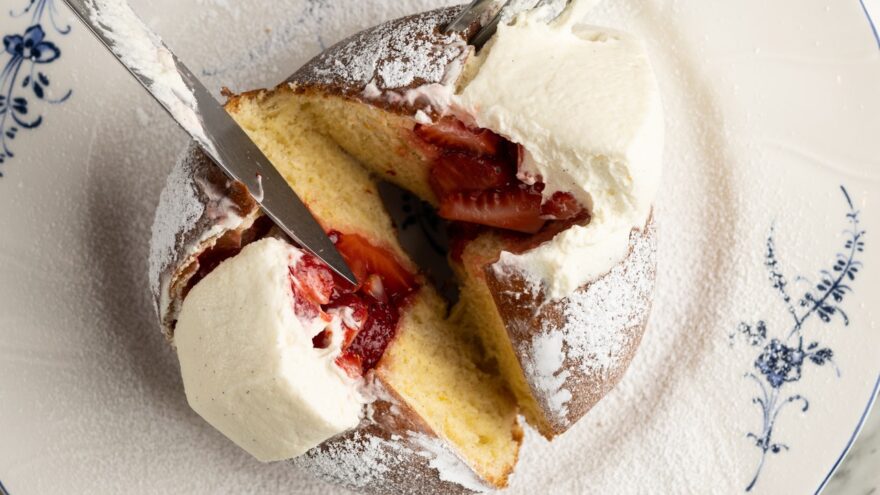Before Shannon Swindle even got the job as pastry chef at Mother Wolf in Los Angeles, he knew maritozzi were destined for the dessert menu. The restaurant’s bouncy, football-shaped Italian brioche buns are filled with an absurd amount of cloud-like whipped cream and hide a surprise sweet-tart pocket of macerated Harry’s Berries. “It’s a bit more dessert-y than the classic” bun, which is typically eaten for breakfast in Italy, Swindle says. But it’s still “iconically Roman.”
The original maritozzo—a dough-based roll sliced open and stuffed with a neat swipe of cream—supposedly dates back to medieval Rome, where a dairy-free version filled with dried fruit and nuts was eaten during Lent. And the lightly sweetened, cream-filled masterpiece was allegedly used to hide an engagement ring during a marriage proposal. (The word marito means husband in Italian.) Over 1,600 years after these big buns first hit the culinary scene, they’re having somewhat of a renaissance in the U.S., thanks largely to a seminal cookbook, the lighter fluid that is social media, and a gaggle of buzzy restaurants like Mother Wolf putting marizotti on the menu.
The bulbous yeasted buns have been a sleeper hit at the Hollywood restaurant, which sells about 50 each night. But Swindle’s also seen maritozzi “show up more and more” on internet feeds in the last couple of years. It makes sense: With their lovable Pac-Man vibes, rich buttery dough, and shameless amount of aerated dairy, maritozzi seem manufactured for TikTok, where a slew of soothing recipe videos for the pastry has gained over 21 million views. The search term, according to Google Trends, also shot up dramatically at the start of the pandemic—a time when we most needed the light and fluffy.
Instagram content
This content can also be viewed on the site it originates from.
These days you’ll find them in restaurants and pastry shops across the country, says Rick Easton, baker and owner of Bread And Salt in New Jersey, which has consistently sold out of its classic maritozzi since he started serving them two years ago. Easton suspects their rising popularity in the U.S. might have been seeded back in 2016, via Tasting Rome, Katie Parla and Kristina Gill’s canonical cookbook full of ancient recipes from the eternal city. “I think it introduced a lot of Americans to the maritozzo,” he says. And in the years since its release, “a lot of people have seen them on the internet and wanted to give them a try.”
Still, quality matters more than fickle trends, says Warda Bouguettaya, pastry chef and owner of Detroit’s Warda Pâtisserie. There you’ll find the sweet buns two ways: filled with a vanilla bean whipped mascarpone or harboring a glut of chocolate hazelnut cream. Though it’s the brioche Bouguettaya really credits for their popularity. Inspired by one she came across in Brittany, France, the recipe involves “slowly adding butter to the dough, then kneading it on high speed for almost 10 minutes to create the perfect light crumb.” The resulting squishy buns are one of Warda’s most popular breakfast orders.
